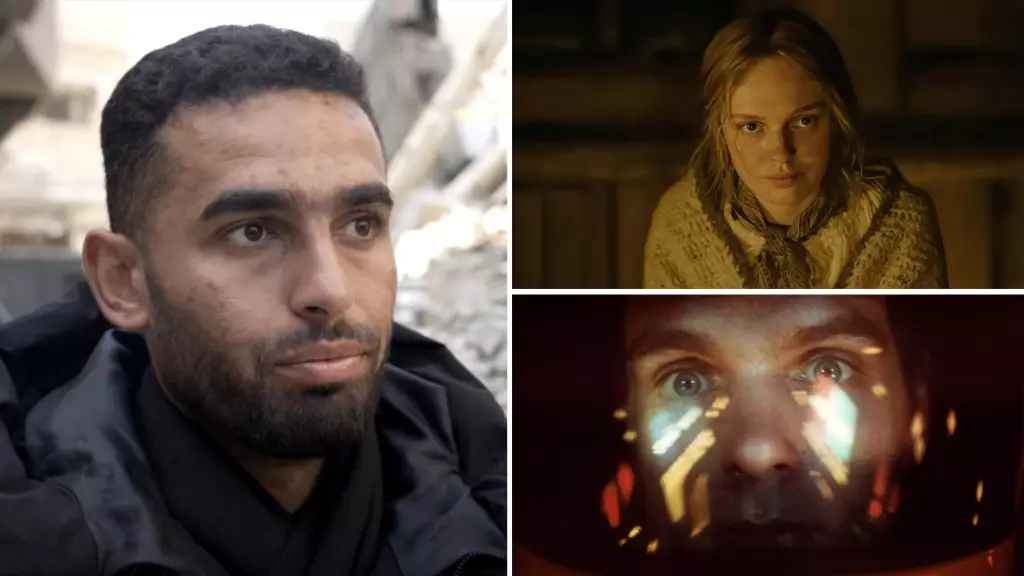As the cinematic landscape braces itself for the awards season, one film emerges as a poignant narrative of survival and hope: “From Ground Zero.” This documentary stands out not only for its artistic merit but for its raw depiction of life in Gaza during times of intense conflict. Set to debut in about 70 AMC locations across major U.S. markets and select arthouse cinemas, the film by Watermelon Pictures consists of 22 intimate video diaries created by Palestinian filmmakers. Rashid Masharawi, a notable figure in this project, threads these individual accounts into a broader narrative that encapsulates the day-to-day struggles of families amidst the chaos of bombings.
“From Ground Zero” notably refrains from diving deeply into political discourses, a choice that may initially seem like a missed opportunity. However, this decision reinforces its underlying theme: the human spirit. By steering clear of overtly politicized narratives, the documentary invites audiences to engage with the lived experiences of individuals—filling the film with genuine moments of humanity that resonate with viewers on a personal level.
The strategic timing of the film’s release is intriguing. Launching shortly after its inclusion in the Oscar shortlist carries with it a significant risk—one that Watermelon Pictures appears willing to embrace. The uncertainty surrounding its Oscar candidacy could deter many studios, yet Masharawi and his team understood the importance of showcasing stories that otherwise fade into obscurity under the noise of major studio releases. Their commitment signals not just a dedication to the art of filmmaking, but a responsibility to amplify voices that are often silenced.
With Oscar voting slated to begin next week, the film’s presence in theaters comes at a critical juncture. Distribution executive Justin DiPietro is guiding the launch, carefully selecting locations where audiences with ties to Palestinian communities, such as Chicago and Detroit, can engage with the film. This strategic placement enhances its potential for viewership and recognition, allowing the unique perspectives of Palestinian life during conflict to shine through amidst a market flooded with both major studio blockbusters and indie gems.
While “From Ground Zero” garners attention as an Oscar contender, it does so within a saturated market. The film is set to compete not only with mainstream releases but also with a host of indie films striving for a similar spotlight. The robust critical reception—with a striking 93% approval rating on Rotten Tomatoes—is indicative of its quality and the poignant narratives it encapsulates. Critics laud it as an “unfiltered window into resilience,” framing it as essential viewing during this tumultuous period in history.
While the film holds its ground in the international feature race, another entry to note is the horror-thriller “The Damned,” directed by Thordur Palsson. Premiering on a substantial 732 screens, this film presents a stark contrast to Masharawi’s work. It tells the tale of a widow faced with a harrowing moral choice when desperation strikes an isolated fishing community in 19th-century Iceland. While “The Damned” may garner a different audience, its emergence alongside “From Ground Zero” signifies the diverse storytelling present in contemporary cinema.
Shifting gears within the film industry, other projects are also gaining traction, notably a retrospective on artificial intelligence at NYC’s Film Forum. This exploration delves into how cinema has warned society about the implications of AI—a theme that resonates amid current discussions surrounding technology’s role in our lives. Featuring films that date back to Fritz Lang’s groundbreaking “Metropolis,” the retrospective underscores the intersection of art and societal concerns that has persisted for nearly a century.
As Bruce Goldstein, the program curator, highlights, we are inundated with AI propaganda that frames the technology in an overwhelmingly positive light. In contrast, classic films paint a more cautionary tale. The contrast between human ingenuity and the malevolence often associated with AI creates a fertile ground for discussion, one that mirrors the narratives found in “From Ground Zero.”
In a world where narratives about marginalized communities are frequently hijacked or overlooked, the release of “From Ground Zero” is a significant moment for representation in cinema. It serves not just as entertainment but as an educational vessel that shares the lived realities of those in Gaza. As we anticipate its impact in theaters, it remains imperative that audiences engage critically with the stories presented. The dialogues inspired by this film may pave the way for deeper understanding and empathy, forging connections despite the cultural and political divides that often separate us.
“From Ground Zero” emerges as a film that transcends its medium by offering a vital exploration of humanity amid suffering. As it finds its place within the film industry, it is crucial for audiences to recognize the power of such narratives—they remind us of our shared humanity and the strength found in resilience.

